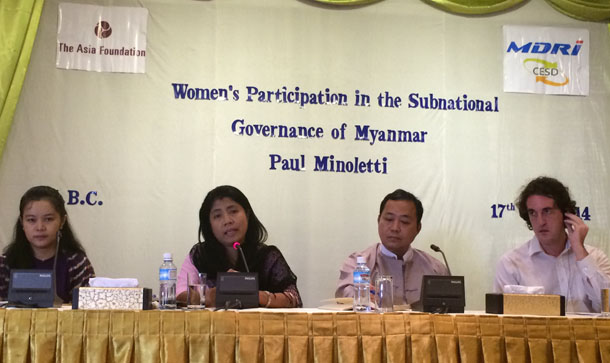RANGOON — New research reaffirms that women’s participation in decision-making processes is still low in Burma, and calls for a quota system to increase their representation in governance.
Burma ranks the lowest of all Southeast Asian countries for women’s representation in governance, and 170th of 185 selected countries worldwide, according to the Myanmar Development Resource Institute (MDRI), a government-affiliated think-tank.
In a study from February to May, with interviews conducted in Karen and Kachin states as well as Rangoon and Naypyidaw divisions, researchers found there were no women were leading township-level administration, while only 0.11 percent of village heads were women. Most of these women were working in Karen State, in the country’s southeast.
The study found that only 4.42 percent of lawmakers in the Union Parliament were women, compared with 2.83 percent of lawmakers in state and divisional parliaments.
During a briefing on the study in Rangoon on Tuesday, researcher Paul Minoletti said the findings highlighted long-rooted gender inequality in the country, and he recommended using a quota system to promote women’s participation in governance.
“Serious consideration should be given to the introduction of a quota system, as a means to raise participation from the currently very low levels,” he said.
“Within subnational government, the elected position of state and region MPs, and of village and ward administrators, would seem to be most obvious ones where a quota system could be introduced. International experience shows the success of quotas in raising women’s participating and ensuring government becomes more responsive to the needs of women and the preferences of women.”
He added that any quota system would need to be designed carefully to suit Burma’s needs, as quota systems have been successful in some countries but less successful in others.
About 50 academics and members of civil society groups as well as NGOs attended the briefing, which also included discussions on cultural and religious norms, education, health and media.
Nyo Nyo Thin, a lawmaker in the Rangoon divisional parliament representing Bahan Township, said she supported a quota system to help women reach leadership positions.
“Women are much more qualified than people think,” she said. In Burma, she added, “women are not favored by the [political] system, and their weakness is that they are not interested in taking [leadership] positions but instead ready to serve others.”
Kim Ninh, the Burma country representative at The Asia Foundation, said the findings would hopefully provide a platform for broader discussion of gender issues in the country.
The MDRI is a non-government research institute founded by advisors to the Burmese president.

















